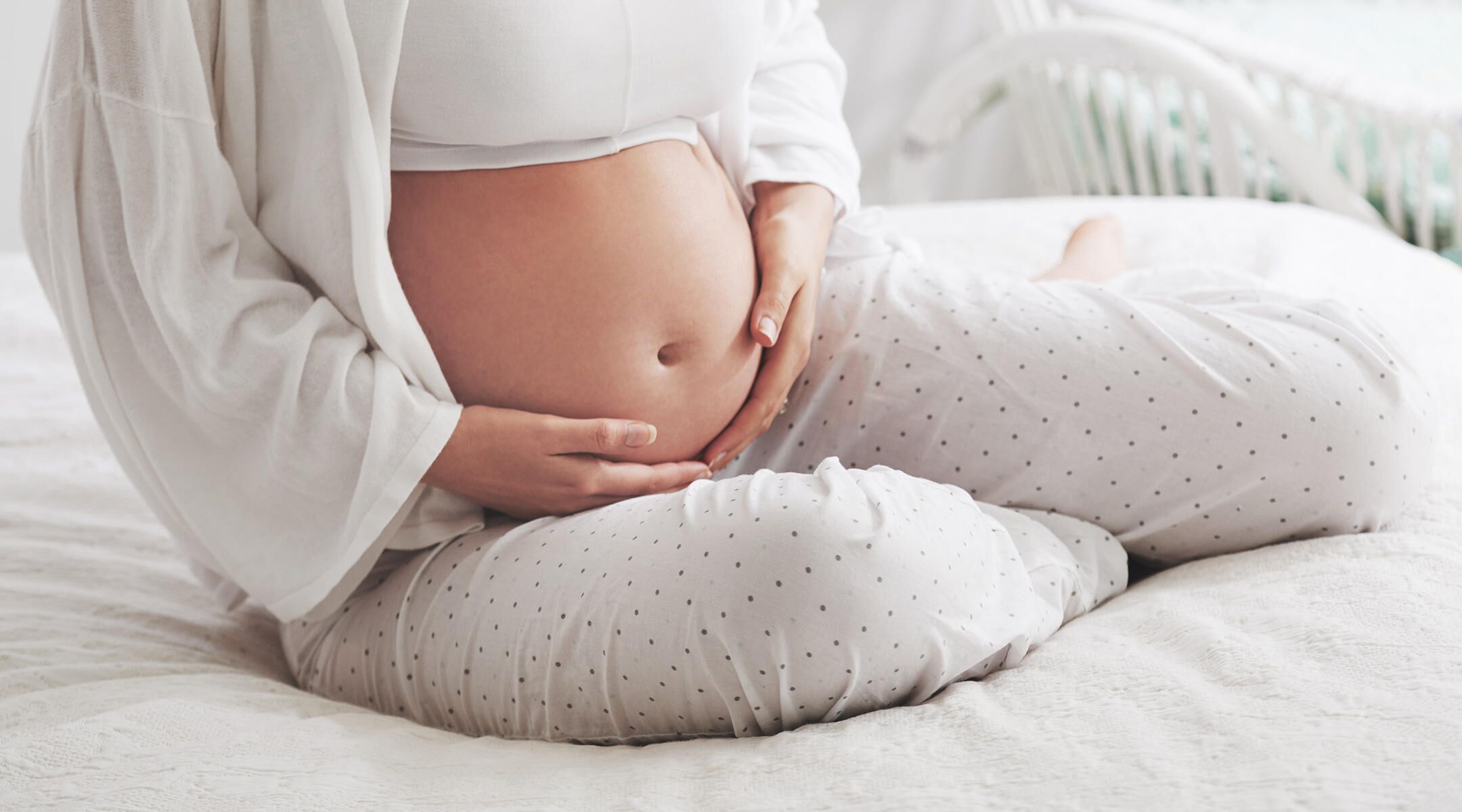Experts Answer: Can You Take Sleeping Pills During Pregnancy?
Are you tossing and turning all night, wishing you could fall asleep? Pregnancy insomnia is no joke. I was there only a few months ago, staring at a ceiling fan all night, desperate for quality sleep.
Maybe you’ve thought about taking a sleep aid during pregnancy to help get you some much-needed zzz’s. Or maybe, there’s one you swore by before pregnancy but you’re not sure you can take it now. While the research on sleeping pills during pregnancy is pretty limited, there are certain medications doctors recommend over others. “These medications tend to be very necessary, considering that pregnancy insomnia can drive you crazy,” says Mana Baskovic, MD, an ob-gyn, robotics surgeon and chief medical officer at Lushi, a fertility platform. “Getting a head start on exhaustion before baby has even arrived is cruel.”
One thing’s for sure—you’re tired and need a solution. Keep scrolling for everything you need to know about whether you can take your pregnancy sleep aid of choice, including safer sleeping pill options, which ones to avoid and some more natural ways to help you get some rest.
- Certain over-the-counter sleep aids, such as Unisom and Benadryl, are generally considered safe for pregnancy. Always make sure to ask your provider first.
- Most providers caution against using prescription medications such as Valium and Ambien during pregnancy.
- If you’re having trouble sleeping during pregnancy, it’s best to first try a natural alternative like yoga, massage and improving your sleep hygiene.
Sleeping pills typically fall into two main categories: over-the-counter (OTC) and prescription. Anyone 18 years or older can purchase OTC sleeping pills at a drugstore. These OTC sleeping aids are often powered by antihistamines—drugs that are usually used to treat allergies but can also cause drowsiness. Examples of OTC sleeping aids include Benadryl, ZzzQuil, Tylenol PM, doxylamine (Unisom) and melatonin.
On the other hand, there are prescription sleeping pills. These are generally stronger than OTC choices, so you’ll need a script from your provider to get them. These include zolpidem (Ambien), eszopiclone (Lunesta), temazepam (Restoril), lorazepam (Ativan), diazepam (Valium) and trazodone.
“I asked my doc about what I can do if I have trouble sleeping. He suggested taking a Benadryl. He said it’s safe to take during pregnancy. I'm pretty sensitive to it, so I just take a half dose and it'll knock me out all night.” — cdc1982, The Bump community member
It’s important to chat with your provider before taking any sleeping pills during pregnancy. “My first-line treatments are generally lifestyle modifications or supplements before resorting to medications,” says Amber Chambers, CNM, a certified nurse-midwife at Pediatrix Medical Group in Florida. It’s difficult to determine the true safety of taking sleep medications during pregnancy since studies often exclude pregnant people. That’s why it’s important to consider the pros and cons before using any sleeping aids while pregnant.
That said, you definitely have options—but make sure to speak with your provider about which sleeping pills are safe during pregnancy and which ones to avoid.
Safer sleep aids while pregnant
If the benefits of getting quality sleep outweigh the potential risks of negative interactions to you and baby, your provider might recommend some common sleep aids. Here are a few safer options, according to Chambers:
- Doxylamine. More known under the brand name Unisom, this drug is mainly used to treat nausea in pregnancy. However, its sedative effects also make it an approved sleep aid.
- Diphenhydramine. Benadryl, Tylenol PM and ZzzQuil are all common brand names of diphenhydramine. This drug works by binding to your central nervous system and suppressing activity, resulting in drowsiness. This makes it useful to treat insomnia in some cases. Diphenhydramine is generally considered safe for occasional use, notes Chambers.
- Trazodone. This drug is often used as an antidepressant. But sometimes, providers prescribe trazodone in pregnancy to help with insomnia due to its sedative effects.
- Melatonin. Naturally occurring in our bodies, this hormone plays a huge role in sleep. Mayo Clinic states that supplementing with melatonin has been shown to help promote rest. In pregnancy specifically, research shows that taking melatonin during pregnancy is probably safe but there’s need for more research.
“I take Unisom for nausea from pregnancy and a wonderful side effect is that I'm actually sleeping again! My doc is the one who told me to take the Unisom, and I know lots of preggos who've taken it.” — miaomi, The Bump community member
Unsafe sleep aids while pregnant
There are a few sleep aids experts say to stay away from while pregnant. Primarily due to their potential adverse effects on the pregnancy and baby, it’s best to avoid them altogether unless absolutely necessary. Chambers lists a few here:
- Benzodiazepines. Medications such as Valium, Ativan and Xanax come with risks of birth defects and neonatal withdrawal, says Chambers. Research also shows that benzodiazepines may be associated with a higher chance of preterm labor, cesarean delivery and low-birthweight infants.
- Zolpidem. More commonly known as Ambien, this drug may be associated with withdrawal symptoms in newborn babies. On top of that, taking zolpidem toward the end of pregnancy can increase these chances even more, notes the UK’s National Health Service.
- Eszopiclone. Also commonly known as Lunesta, this drug is another unsafe sleeping aid. There’s very limited safety data so it’s best to avoid during pregnancy, says Chambers. What’s more, the FDA label on Lunesta mentions the possibility of fetal harm in animal studies.
- Herbal supplements. Some herbal supplements, like passionflower, are praised for their sedative effects. However, the American Pregnancy Association (APA) warns pregnant people to stay away from this herb and others due to the lack of extensive research on herbal remedies and pregnancy. Be sure to ask your healthcare provider if you have questions about specific herbs.
It’s a known fact—pregnant women struggle with sleep. Common causes of insomnia in pregnancy include hormonal fluctuations, physical discomfort, having to get up and pee all the time and stress, says Chambers. (Sounds familiar!)
“Sleep disturbance and insomnia increases during the normal course of pregnancy, affecting one in four women in the first trimester to over two-thirds by the end of the third trimester,” says Baskovic. New research also shows that women who don’t get enough sleep while pregnant have higher risks of developing preeclampsia and gestational diabetes, as well as increased rates of C-sections.
There’s not enough research out there on the full scope of risks associated with taking sleeping pills during pregnancy. That’s why it might be best to try more natural sleep aids first. One method Baskovic suggests is improving your “sleep hygiene.” Things like drinking a cup of tea, taking a warm shower, meditating and trying some light reading before bed are all relaxing activities she recommends. Another pro tip? Try to avoid watching TV or excessive phone use right before you hop into bed.
Here are some other alternatives to taking sleeping pills during pregnancy, according to Chambers:
- Prenatal yoga
- Exercise
- Prenatal acupuncture
- Massage
- Cognitive behavioral therapy
- Magnesium supplements (with your provider’s approval)
Frequently Asked Questions
What causes insomnia during pregnancy?
Common pregnancy symptoms like nausea, frequent peeing, leg cramps, back pain, baby moving, shortness of breath, anxiety about birth and heartburn are all causes of insomnia during pregnancy, notes Cleveland Clinic.
Can you take Unisom while pregnant?
Unisom is commonly used in pregnancy for nausea and insomnia and is generally considered safe in moderation, says Chambers. If you’re 18 or older, you can buy Unisom over the counter, but it’s best to talk to your provider first before taking any medications during pregnancy.
Can you take Ambien in pregnancy?
Ambien is a category C drug, meaning it may be harmful to a growing fetus. A class C drug also means studies have shown risks in animals with the drug and that human data on its safety is very limited. “It’s generally avoided unless benefits outweigh risks,” says Chambers.
Is ZzzQuil safe during pregnancy?
If the benefits outweigh the risks, your provider might suggest occasionally taking ZzzQuil as a sleeping aid during pregnancy. Keep in mind that ZzzQuil is a diphenhydramine, which some studies have shown to cause temporary withdrawal symptoms in newborns after birth. You should talk to your provider first about the pros and cons of taking ZzzQuil during pregnancy.
Can I take Tylenol PM while pregnant?
Baskovic says taking Tylenol PM in pregnancy can be safe in moderation—it actually contains the same drug that causes drowsiness as Benadryl. However, it’s best to take straight Benadryl instead to avoid the added acetaminophen. “Tylenol PM also contains acetaminophen, which has no effect on sleep, and while safe in pregnancy, you don’t want to accidentally take too much,” points out Baskovic.
We know by now that some sleeping aids are safer than others during pregnancy. And, unfortunately, experts won’t truly understand the full effect of sleeping pills on babies in the womb until more research is done.
If you need a sleep aid during pregnancy, try some lifestyle adjustments first. Or, ask your doc about a magnesium supplement. If none of that works and you’re still desperate for sleep, chat with them about a safe sleep aid for pregnant women for occasional use. Hang in there—we’re sending all the restful vibes your way.
Please note: The Bump and the materials and information it contains are not intended to, and do not constitute, medical or other health advice or diagnosis and should not be used as such. You should always consult with a qualified physician or health professional about your specific circumstances.
Plus, more from The Bump:
Mana Baskovic, MD, is an ob-gyn, robotics surgeon and chief medical officer at Lushi, a fertility platform. She earned her medical degree from Western University and has a special focus on pregnancy, fertility and the impact of microplastics and toxins on women's health.
Amber Chambers, CNM, is a certified nurse-midwife at Pediatrix Medical Group in Florida. She earned her degree from Frontier School of Midwifery & Family Nursing.
American Pregnancy Association, Herbs and Pregnancy
Brazilian Journal of Psychiatry, Melatonin Use During Pregnancy and Lactation: A Scoping Review of Human Studies, May-June 2022
Chest, Sleep Pharmacotherapy for Common Sleep Disorders in Pregnancy and Lactation, October 2019
Cleveland Clinic, Pregnancy Insomnia, January 2024
Food and Drug Administration, Lunesta (Eszopiclone) Tablets, May 2014
Johns Hopkins Medicine, Get A Good Night’s Sleep During Pregnancy
Mayo Clinic, Melatonin, August 2023
MotherToBaby, National Library of Medicine, Trazodone, July 2023
National Health Service UK, Pregnancy, Breastfeeding and Fertility While Taking Zolpidem, January 2023
Obstetric Medicine, Insomnia and Sleep Deficiency in Pregnancy, September 2015
StatPearls, National Library of Medicine, Diphenhydramine, July 2023
StatPearls, National Library of Medicine, Doxylamine, June 2023
Learn how we ensure the accuracy of our content through our editorial and medical review process
Navigate forward to interact with the calendar and select a date. Press the question mark key to get the keyboard shortcuts for changing dates.





















































